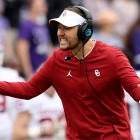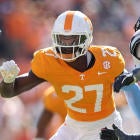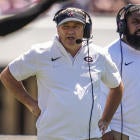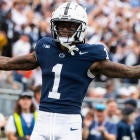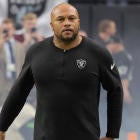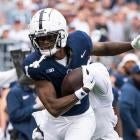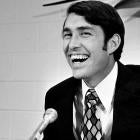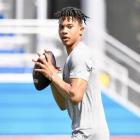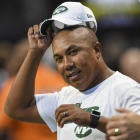Lincoln Riley became the conscience of college football on Wednesday, if only for a day. Oklahoma's coach eloquently furthered his explanation as to why his school is waiting until July 1 for players to return from coronavirus exile.
He also indicated why considering any earlier start is "ridiculous."
"I think it would be completely irresponsible of us to bring these guys in [now]," Riley previously said during a Zoom call with media in May. "In my opinion, we need to bring them in as late as we possibly can before we play the season. Every day early that we bring them in is a day we could have gotten better. It's a day we could have learned more about the virus. [Personal protective equipment] could have gotten better. A day closer to finding a vaccine. It's just not worth it."
How thoughtful. How smart.
How has anyone gotten the idea at this point that players will be "safer" gathered together on campus?
Riley's remarks Wednesday came on the same day Oklahoma State reported three positive tests after a comprehensive testing of players, coaches and staff that have returned to campus. Iowa State also announced a positive COVID-19 result within its athletic department. On Monday, Marshall reported two players and one staff member had tested positive.
Monday was the first day players could report for voluntary workouts following the lifting of NCAA moratorium on athletic activities. Judging by reports, most programs -- including the remainder of the Big 12 -- will have players back by June 15.
Judging by what we know for sure about the coronavirus, a return to play at this point is based on hope, prayer and improved testing capability.
Oklahoma has become a sort of outlier, choosing to return July 1 citing safety and simple science. During a pandemic, the more folks stay separated, the more it mitigates the spread.
Amid that medical certainty, football is trying to shoehorn in a season amid uncertainty.
"Until we have a treatment, until we have a vaccine, [it's uncertain]," said Oklahoma head trainer Scott Anderson, who has helped shape the program's return-to-play philosophy. "In terms of more people we get together, the longer they're together, the closer they're together, that elevates risk. The reality is it doesn't serve any of us to have some outbreaks."
What's wrong with a football factory being cautious -- maybe overly cautious -- staring down the barrel of a pandemic?
"We're not the NFL," Riley said Wednesday. "There are some huge, huge differences in us being able to put on a successful season versus a professional league. If we do it right, if we're patient enough on key areas like when we bring players back on campus, I do believe -- if you don't get ahead of ourselves -- we'll have a season.
"We've got to be patient. We get one shot at this."
It just seems odd -- and inspiring -- hearing a safety first message being preached by one of the most successful coaches in the game.
"I think it's our job as football coaches," Riley said. "We have to look at this way, way beyond what's most competitive for our own team. For a lot of coaches, that's hard. We're wired different."
Note that the 36-year-old Riley was recently named CBS Sports' No. 1 coach under age 45. He has taken the Sooners to the College Football Playoff and a Big 12 title in each of his first three seasons leading the program.
Riley made some of the biggest news of the lockdown in mid-May when he said the idea of bringing players back on June 1 was "one of the most ridiculous things I've heard."
He doubled down Wednesday, four days short of his third anniversary of being named OU's coach. Once again, Riley called an early return ridiculous. Even on July 1, there will be numerous necessary safeguards.
"Probably one of the biggest differences when guys come back, we're not going to have them all together at once," Riley said. "[You're] not going to have any meetings in your team meeting room. It's not going to happen."
Riley suggested he might have his team go outside in the stadium. Gaylord Family-Oklahoma Memorial Stadium does have a heck of a video board.
Riley has thought this out to the point he revealed some of Oklahoma's protocol. Infected players will be quarantined at a designated spot on campus. Staffers will quarantine at home. But admittedly, all that protocol could change.
"That's one of the advantages that we talked about for us," Riley said of the decision to start later. "We get to see how this goes.
"This was made well before the Big 12 made a decision. It was made before any other league made a decision. It was made before the NCAA came out and said what you could or couldn't do. We knew what we were going to do."
Riley hinted at his philosophy early into the lockdown when he was asked how long he'd need to get his team ready for the season. He suggested early August, the traditional opening of camp, claiming Oklahoma needed just 15-20 practices to be prepared.
At the time, it sounded football first. Now, it sounds rational. It was also another indication college football doesn't have to be a year-round sport. When it is, bad things have happened, such as the deaths of more than 30 players -- usually in the offseason -- since 2000.
"As you know, he's an incredibly smart guy," Anderson said. "At one point in time, his career choice was to be a physician or surgeon. He has the intelligence and aptitude to do that."
The NCAA Football Oversight Committee is due to submit return-to-play recommendations to the NCAA Council on June 17.
July 15 is widely considered to be the date programs can fully return to football activities. That would give teams 6-7 weeks to prepare for the season.
For now, it's voluntary drills: layers lifting dumbbells and dodging the virus without coaches present.
For the moment, Oklahoma is happy to sit this one out.
"If you and I had talked on April 15 or May 1 [about] football student-athletes returning to campus this summer, we would have said, 'We think you're kind of crazy,'" said Shane Lyons, the oversight chair and West Virginia's athletic director.
"What you find out in these processes is everybody has their opinion. Lincoln has been voicing concerns on what he believes is right."
Meanwhile, Oklahoma State, Iowa State and Marshall are dealing with positive tests practically before players push up their first bench press. Texas is talking about allowing coaches back in their offices next week.
When Oklahoma football opens its doors on July 1, its coach can at least look himself in the mirror.
"Why would you bring your staff in right now when you can wait two, three, four weeks when you can learn more?" Riley said. "… I'm not comparing it to what anybody else is doing. Everybody's got to make their bed and lie in it."













